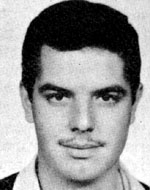Vazana, Shmuel (“Shmulik”)
Son of Albert and Perachia. He was born on September 1, 1945, in the city of Marrakech, Morocco. Was the first grandson of a privileged family headed by the community leader in his hometown. He attended elementary school there and in addition studied Hebrew and religious studies in the “cheder” and was prepared, in terms of spoken language in Israel and in terms of his knowledge, to enter the sixth grade of the Bar-Ilan elementary school in Herzliya and to progress in his studies. He was a member of the Bnei Akiva youth movement because his family was observant and in the spirit of religion he was educated. He had some good qualities in his youth: he would respect every person, especially his parents. During summer vacations he went to work to relieve his parents’ distress in purchasing textbooks – and did not disdain any job he had. Just as he preserved the honor of his parents, he also respected his teachers – and even his friends. Shmuel knew how to encourage his father in his absorption in Israel. He was humble and timid and did not boast of his success in his studies, for he saw it as a perfectly natural thing. His friendship was unqualified and he would defend the rights of a friend when he saw some discrimination. When he graduated from high school in Herzliya, he wanted to deepen his knowledge, but since two things were sacred to him – Ha’aretz and the army – he enrolled in the academic reserve and studied at the Hebrew University in Jerusalem until the end of the third year in political science and Arabic language and literature. So you had to take the final exams before you received the B.A. In the last years of his life, security matters and the fate of Jews in the Diaspora were close to his Lev, and he was especially concerned about immigration problems. His aim was to encourage his compatriots to immigrate. He also showed his love for the homeland. During the course of his service, he successfully completed a course for a lieutenant colonel and an officers’ course, and at the outbreak of the Six-Day War he steadfastly supported all his comrades and fulfilled the task he was entrusted with. Was killed in a battle that took place at Armon Hanatziv in Jerusalem, in which a sniper’s bullet was hit and brought to rest in the military cemetery on Mount Herzl in Jerusalem. Pages in memory and image in the book “Nizkor” published by the Hebrew University of Jerusalem and the Student Union Rosie, history and things were about heroism.
